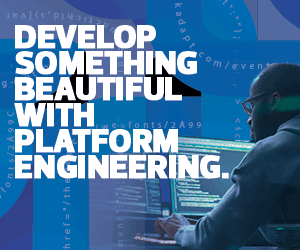What Is Platform Engineering?
Platform engineers build and maintain the underlying cloud-based technologies that power software systems. Other IT professionals use the platform’s self-service and automatic capabilities to deploy and operate software solutions.
“Platform engineering is what happens behind the scenes,” explains Rick Campion, director of product engineering at Artisight. “We build the services, the pipelines and the infrastructure from a software perspective.”
“The use of platform engineering is not a replacement for DevOps or software engineering. Rather, it is a service ushering in a new generation between IT and developer teams,” adds Rodrigo Flores, global platform engineering services leader at IBM. “While developers and software engineers are building solutions for end users, platform engineering is enhancing that experience through automation.”
EXPLORE: Learn how a modern data platform supports decision making.
What Does a Platform Engineer Do?
Think of video chat systems such as Zoom, Microsoft Teams and Google Meet. A platform engineer builds the back-end architecture that enables the software to function properly — for example, the technology that aligns a person’s lip movements with their voice or connects the computer’s camera to the shared stream.
“It looks like a simple web page, but the technology behind the scenes is much more complex than people realize,” Campion says. “The platform team takes that complexity away. The front-end team that designs the user interface leverages all of the tools we built behind the scenes.”
Platform engineers’ daily responsibilities include making adjustments and improvements to existing platforms as well as working to develop even more advanced platform technologies. Since any technology can have operating issues, platform engineers also build monitoring tools and fix problems that may arise.
Platform Engineering vs. Software Engineering
Consider a smartphone: A platform engineer builds the core technology that enables the phone to download apps, while software engineers design the individual apps.
Artisight Chief AI Officer Rob Ringham cites the example of his company’s Smart Hospital Platform, which uses artificial intelligence-powered cameras and sensors to power its virtual sitting solution.
“Software engineers built the front-end video streaming application,” Ringham says, such as the technology that allows the virtual sitter to navigate between different screens and speak directly to patients.
“The platform engineer figures out how to power the hundreds or thousands of video streams traversing the hospital network at any one time,” he says. “We design it so that the software engineer can easily build those user interfaces.”
“Platform engineering allows developers to lean on past infrastructure operations,” Flores adds. “This improves process automation and enables the reuse of previous tools, creating an open and shareable framework that developers can easily implement and build upon.”












